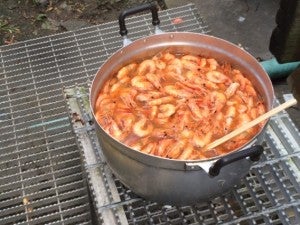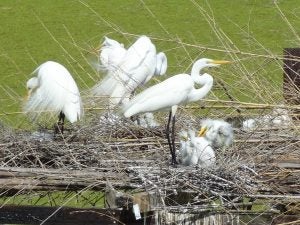5 Reasons Why Other States (And You!) Should Care About Louisiana’s Coastal Land Loss Crisis
By Christina Rouse, Restoration Projects Intern, Environmental Defense Fund
Outside Louisiana state lines, it’s easy to feel disconnected from the Mississippi River Delta. Spatial distance lends itself to mental distance, and adopting an “out of sight, out of mind” attitude seems second-nature. While other cities and states face environmental problems of their own, make no mistake: the ecosystem services and resources produced within Louisiana provide for not only local inhabitants, but all Americans. As someone interested in environmental issues, I knew restoring coastal Louisiana mattered, but now I can really tell you why. This summer, I learned the benefits extend beyond local or regional areas and unite the interests of disparate stakeholders across industries, professions and walks of life. What does Louisiana do for you? Find out below!
- Seafood, anyone? Shrimp, crawfish, crabs, oysters, even alligator – all are harvested along the Louisiana coast. As one of the largest producers of seafood in the United States, Louisiana fisheries put food on the table for people around the country and the world. The industry provides quality you can count on. Louisiana blue crab, for example, remains the only fishery in the Gulf to obtain Marine Stewardship Council certification. According to yearly reports published by the National Oceanic and Atmospheric Administration (NOAA), Louisiana’s constant presence on the leaderboard in fisheries revenue and employment opportunities extends past the Gulf of Mexico to national markets. Next time you pick up shellfish from the supermarket, check where it’s from. The chances of Louisiana origin are nearly 15%, eclipsed only by California – a state 111,425 square miles larger! A disappearing coastline and saltwater intrusion may limit catch and raise prices in the future, which would affect all seafood lovers.
Learn more about the Fisheries Economics of the United States.
- Drive a car? Motor vehicles, from a personal sedan to city busses, require gasoline. Texas may be known as the oil state, but Louisiana takes a close second with 19 operating petroleum refineries and two reserve facilities that hold almost half of the U.S. emergency petroleum stock. Domestic production aside, international imports would be impossible without the Louisiana Offshore Oil Port – the only United States hub capable of handling the largest ocean tankers. Destabilized and eroded shores wreak havoc on infrastructure, increasing vulnerability in the event of hurricanes or floods. This presents environmental, public health and safety concerns as well as the possibility of supply chain disruption, making coastal restoration a necessary component of energy security discussions.
Learn more about Louisiana Energy Production.
- Heat your home? In addition to crude oil, Louisiana contributes significantly to U.S. natural gas production, subsequently providing everyday necessities through electricity. In fact, the state’s Henry Hub sets market prices on the New York Mercantile Exchange – transforming Louisiana from a contributor to a leader. Here, the converging pipeline system links 9 different interstate operations. Considering a large portion of the natural gas withdrawals occur in the Gulf of Mexico, Louisiana plays a crucial role in safe processing and transportation. Land loss challenges the stability of this vast network and futures pricing.
Learn more about natural gas in Louisiana.
- Interested in birds? Be it recreational birdwatching or hunting, the Pelican State classifies as a hotspot for avian activity. Also known as Sportsman’s Paradise, more than 100 million birds make their temporary or year-round homes in Louisiana; this includes the beloved American bald eagle. As a critical nesting location for endangered species and a key stopover point for migratory birds, preserving this habitat remains paramount. Coastal land loss destroys habitat for these dynamic species, disrupting the Mississippi Flyway and threatening populations protected under the Endangered Species Act.
Learn more about Louisiana’s birds.
- Concerned about climate change? Ecological impacts aside, coastal Louisiana offers an example of possible societal consequences due by climate change. The United States holds no immunity against issues such as sea level rise, changes in air and water temperature and increased storm frequency and intensity. Already, communities in southeastern Louisiana are relocating their homes and rebuilding their lives. All of this has tangible and intangible cost; people are paying for climate change in dollars and with their livelihoods and cultures. If anything, the problems faced in the delta serve as a harbinger. As land is lost, so too is heritage and history.
Learn about Louisiana’s climate refugees – the first in the nation.
Food. Resources. Wildlife. People. Culture. Coastal land loss, combined with sea level rise and episodic manmade and natural disasters, threaten the fabric of Louisiana society. In turn, critical elements of Americans’ daily lives – from an affordable commute to a family meal – hang in the balance, despite geographic distances. Although people in other states may not be able to witness the Gulf of Mexico intrude on communities or coastal wetlands, they will certainly feel the effects.
Combatting the complex and intertwined issues surrounding coastal land loss requires comprehensive action on restoration, which depends on support and mobilization from all stakeholders. Above all, Louisiana’s momentum in restoration and mitigation represents a concerted effort to sustain and improve the future – yours included.
Christina Rouse is a Trustee Scholar at the University of Southern California, majoring in Environmental studies, with minors in International Relations and Digital Studies. She has experience in coastal meteorology research through the NREIP at the Naval Postgraduate School. Christina is an avid open water, rescue, and scientific diver, logging dives in California, the Cayman Islands, Belize, and Palau. She is active in educational philanthropic work.


